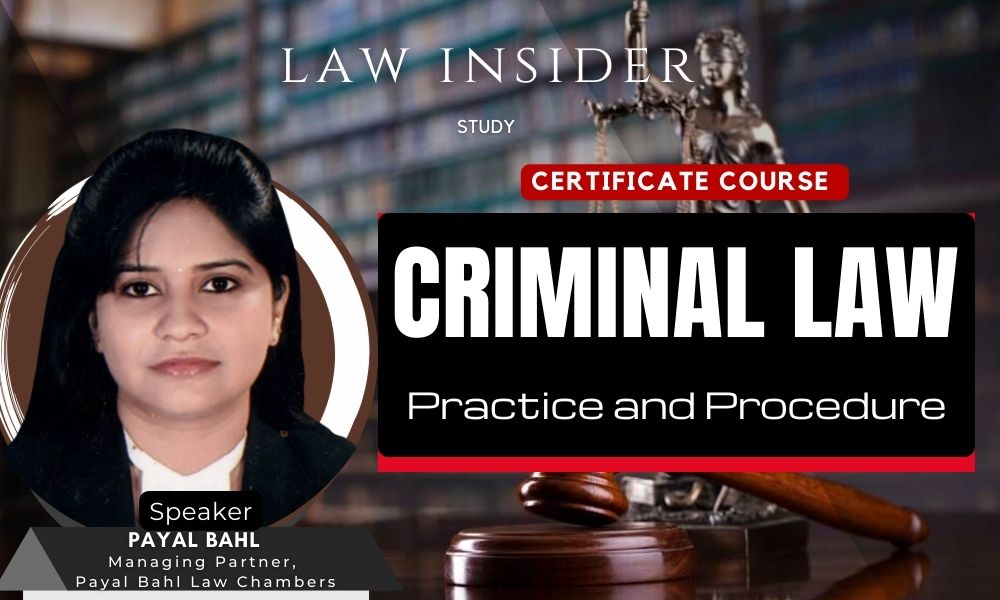Published on 16th August, 2022
Most of the law students or lawyers wish to practice criminal law, defending innocent people falsely implicated in a crime or taking criminals to task in the court of law as a prosecutor.
The primary challenge to doing well in criminal law, however, is learning the craft. Learning the sections by heart does not really cut it. Neither does learning thousands of case laws, though, it is definitely helpful to be knowledgeable.
In this Certificate Course you will get to know legal processes right from the time of lodging an FIR or a complaint in writing, arrest, bail and anticipatory bail, quashing FIRs and related drafting work, trial process, evidence and cross-examination to revision and appeal. You will also get a sense of how to create a litigation strategy for a client.
In other words, this will simplify the first one to three years of struggle when you start criminal litigation practice on your own or begin to learn under a senior. Learning fast is a critical factor in moving ahead of your peers, and this course makes that possible.
Law Insider Criminal Law: Practice and Procedure syllabus covers topics related to the Indian criminal justice system. The course gives detailed information regarding how the state functions and what are the processes that are involved in the detection of crimes when something inappropriate happens.
The course also talks about the fundamental rights of the accused as well as the victim and how fair trials take place. Candidates will acquire knowledge about the security of the accused, victims, witnesses, and other stakeholders connected with the crime scene. The Criminal Justice Administration training also discusses how the sentencing procedures take place.
Law Insider in this Course aims to cover the practical facets of the criminal justice delivery system in India as enshrined within the Code of Criminal Procedure, 1973. This course will illuminate the learner with the diverse procedures adopted by the Police and Judges regarding how to investigate and decide a matter arising out of a criminal doing. It also specifies the rights of an accused person with respect to the conduct of criminal trials.
We through this Certificate Course aim to groom the learners to enable them to develop, sharpen and enhance the criminal trial practice and procedural skills. It is to simulate real time Trial Courts Procedures, training in criminal practice and procedures and to promote and sustain unified spirit to ensure the development of advocacy finesse.
Course Objective:
To understand Law of Crime
To Understand Criminal Trail
Learn what is the use of Electronic Evidence in Trail.
Case Study of important Landmark cases.
Procedural aspects.
Relation with IT Act.
Course Outline:
The detailed Course outline is as follows:
Session Details:
Session 1 on 10th September, 2022 (Day 1)
- FIR
- Essentials of the First Information Report
- Legal Remedy in the event of Non-Registration of FIR
- 154(3) CrPC
- 156(3) CrPC
- 397 CrPC
- 227 CrPC
- 482 CrPC
- 483 CrPC
- Application of Lalita Kumar vs State of UP
- Stages of Investigation
- Police Report
- Closure Report
- Final Report
- Private Complaint and its Stages
- Bail Application and strategy
- Comparative Analysis between State Case v/s Private Case
- Best practices of making complaint u/s 156(3) CrPC and 200 CrPC
Session 2 on 11th September, 2022 (Day 2)
- Key Stages of Trial
- Summons Trial before the Hon’ble
- Warrants Trial before the Hon’ble Magistrate
- Warrants Trial before the Hon’ble Sessions
- Framing of Charges / Arguments on Charges
- Evidence of Charges
- Key Prosecution Strategy
- Key Defence Strategy
- Sentencing & Execution
- Appeal & Bail Application during Appeal
Course Suggested for:
Legal Professionals/Advocates
Law Students
Litigants
Police Personnel
Under Trails
Areas/Enactments Covered:
1. The Code of Criminal Procedure, 1973
2. The Indian Evidence Act, 1872
3. The Indian Penal Code, 1860
QUESTION AND ANSWER SESSION:
Question and Answer session will be there after every session.
Speaker:
Advocate Payal Bahl, Managing Partner, Payal Bahl Law Chambers
CERTIFICATE DISTRIBUTION:
Certificate will be issued after 48 Hours of Successful completion of Course.
Meeting Links will be shared one day before.

